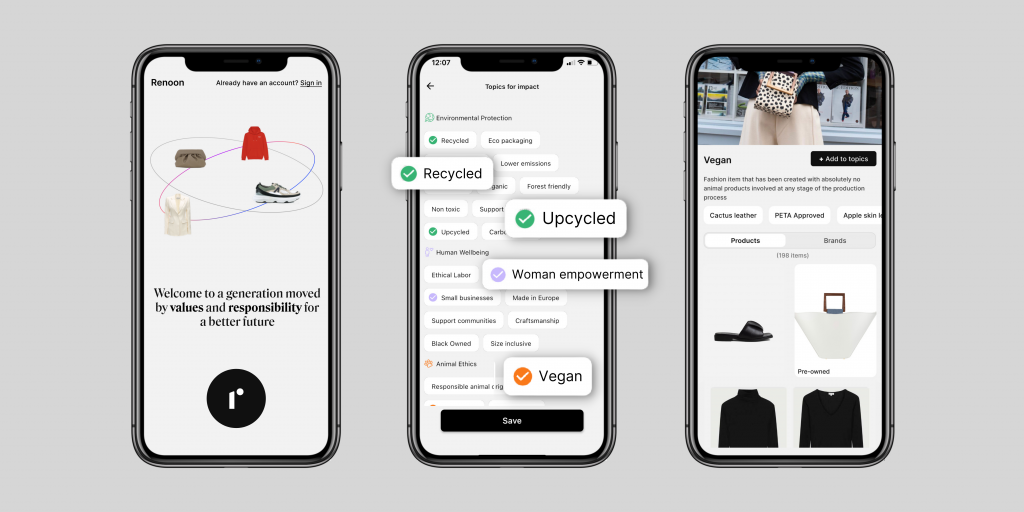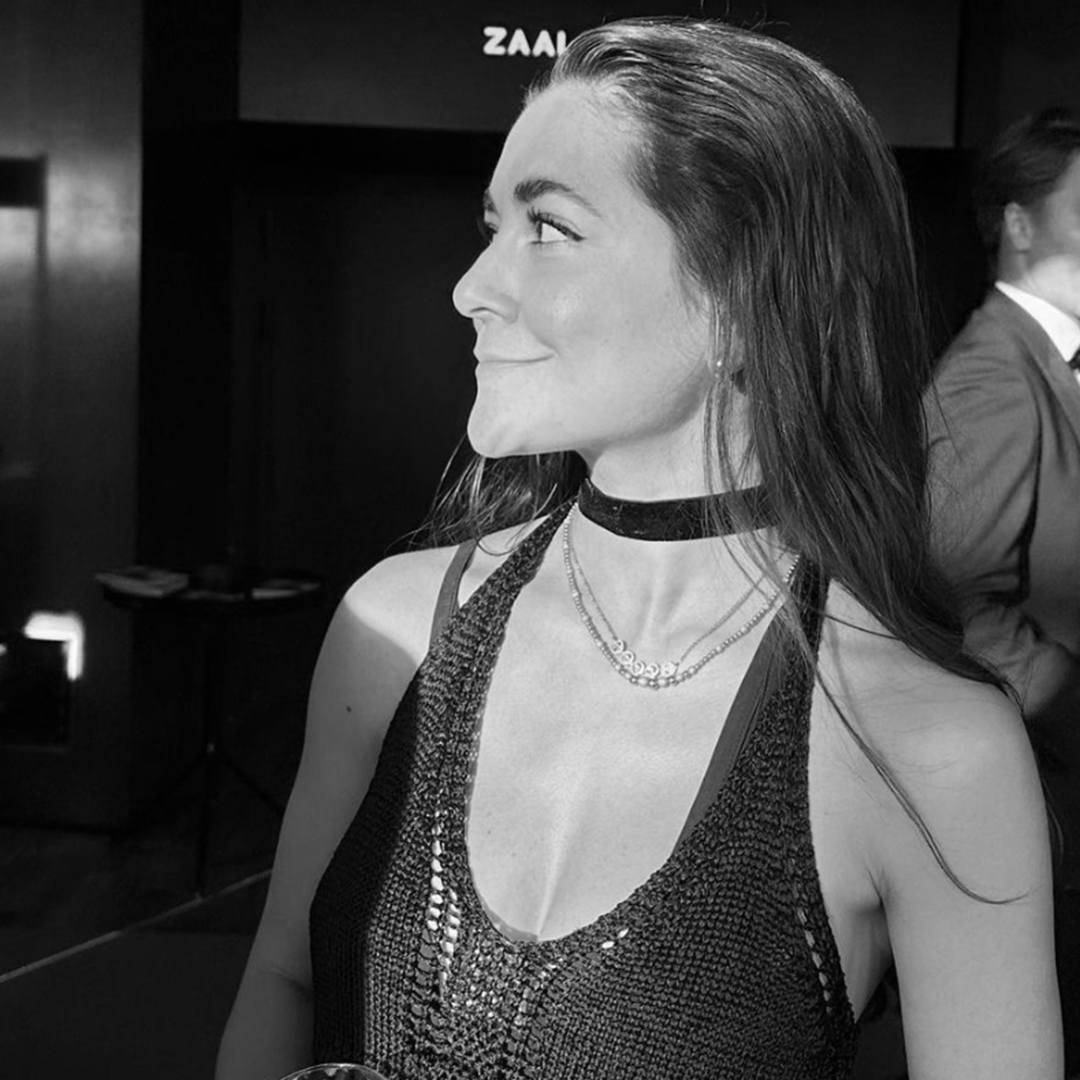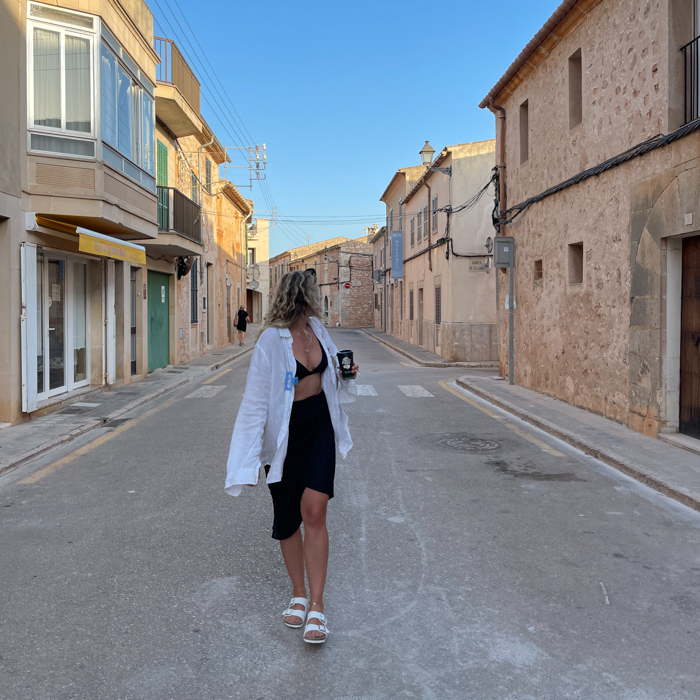Iris Skrami isn’t a new kid on the block regarding fashion. The Milan-born and raised entrepreneur made a name at Nike and has always been passionate about doing things differently. When she searched for a simple, sustainable, black dress, she felt disappointed in the fashion industry. Why wasn’t there a sustainable search engine? Why was it so hard to discover whether a brand or individual product is sustainable? According to Skrami, change was needed.
Cover image: courtesy of Iris Skrami
In conversation with Iris Skrami
It was about time to develop Renoon – the first sustainable fashion app in which you can browse through truly sustainable brands. It allows shopping without guilt – something Skrami couldn’t experience anymore. “I can’t stop buying and enjoying clothes, but at the same time, I’ve always felt sustainability deep in my heart. That’s a big conflict going on inside of me.” Renoon was about to change her life tremendously: “I’ve had a pretty normal life, studying business, starting a career in big multinationals like Nike and Calvin Klein – until I decided to start Renoon.”
Chief sustainability officer
“Sustainability has always been a part of me in ways I can and cannot explain,” Skrami elaborates. “Ever since I was little, I felt like the world was telling me something. It might just be me making it up because I hated having allergies. But for some reason, I felt my childhood in a city had a cost—polluted cities, my milk, dust allergies, and so on. Recently, I even discovered that I once told my dad that I wanted to become the chief sustainability officer as an adult. That didn’t exist. Years passed, and I started to rethink some of the habits I grew up with seriously. I was starting with food. Then I asked myself: what am I wearing? At that time, I was already in the fashion industry and researching what sustainable fashion meant, but I made the connection to my behavior only after a bit. That’s how strong fast fashion was stuck with me. Yes, because I have to admit, I have been the biggest fast fashion addict until I was 24. That was a huge part of me because that’s how I could feed my passion for trends and fashion in my early twenties.” But things have changed since her awareness of sustainability grew. During the search for a sustainable black dress, the idea for Renoon came up.
Start of Renoon
“Searching for a sustainable black dress was the lightning before the thunder. I spent two months searching for it. It was so hard. And even when I found it, I wasn’t sure I had made the right decision. That’s when something hit me: there is no absolute way to make fashion sustainable if people who buy clothes are not involved or informed properly instead of being kept in the dark or lied to. I talked to a person working at Calvin Klein and Tommy Hilfiger. The idea was simple: build a trusted translator between brands and people, making this translator super cool—the new norm. We quickly built our team. We are with four co-founders now.” But then the real challenge came: where do we start from?

It all begins with a pivotal question: what does true sustainability mean? “That’s the big question I started with. I spoke to so many experts with 30+ years in textile and sustainability for years, even before I had the idea of Renoon. I concluded that we need to talk about sustainable values – not sustainability – and a journey – not a point. I like linking sustainable values with something we all have within ourselves: it means finding the balance between who we are and other humans in the world now or who will come after us, together with other living or non-living beings on Planet Earth. And you see, that is a very hard thing to do. I said I like yoga, but I promise this has nothing to do with it – it’s just common sense. Funny thing: this also comes from a shopaholic addicted to fashion like me. After long research at Renoon, we came up with five areas of impact that summarize all the sustainable values you can adopt: Environmental Protection, Human Wellbeing, Animal Ethics, Innovation and Tech, and Modern Consumption. We also like to say that a brand is on a journey: it can be born with sustainability in the heart, transitioning, starting, or sleeping. Only when a brand is at least transitioning do its products show up on Renoon. Otherwise, we only show second-hand or rental options.”
Strict requirements
Fashion labels can’t just enter the Renoon app; there are some strict requirements they have to meet. “Brands need to show us proof points of their sustainability claims. We then evaluate based on the five areas of impact, assigning brands to where they are in the journey. If they enter the best-in-class brands with enough information, we give them our verification. We still have some brands in the app that have not been verified; we use public data only then, but with everyone’s help, our goal is to hype the brands to share the information with us and get properly verified.” Brands also need to pass the product test: “We have an AI that checks composition, material, certification, and compares it to other products to get the best items only. The message is: we work our eyes off to make our science better and better every day for you, as it will never be perfect, but always a journey together.”
At last, if anything were possible, the fashion industry would look completely different, according to Skrami: “Everyone would own something you could print out of your closet and then de-materialize every night. We would have so much fun designing the craziest things.”
Also read: Interview with Max Zara Sterck: “My garments are my babies”










